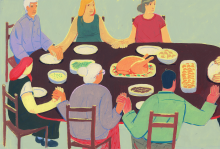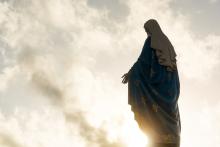Advent

I’M NOT SURE where I thought we would be by now, but I didn’t think we’d be here. A global pandemic has ravaged and killed too many of our loved ones to name, though we could have contained it through collective measures. Climate change continues unabated despite decades of warning and appeal, and we may have missed our window to prevent its worst impacts. We’re experiencing perils that are unnecessary and completely caused by our selective will.
Christmastide and the Epiphany season are opportunities for us to recall and perhaps draw hope from the story of God’s inbreaking into a desperate human condition. But we must also remember that, despite God’s extraordinary proximity to humanity in those days, trouble persisted. Jews were still under a repressive occupying power. They were worshipping in a temple built by a leader invested in his own oppression, put in power by their oppressor. Very little seemed to change. If anything, it appeared to get worse.
As with the people in those times, so it is with us today. We who read the text get a peek behind the veil of worldly power to see what God was doing in the shadows. We see what was obscured from those who cried to their Creator or who’d perhaps run out of tears to shed. We see what they could not see at the time. The preacher and teacher will need to pull back anew this curtain for the people—and for self.

DURING ADVENT, I always love reading and reflecting on Mary’s Magnificat, which begins, “My soul magnifies the Lord.” This song is more well-known and treasured within the Catholic Church than in my own tradition; I didn’t fully learn to appreciate it until I started delving deeper into Catholic social teaching. It is easy to gloss over how radical and profound this song of praise is (“He has brought down rulers from their thrones but has lifted up the humble. He has filled the hungry with good things but has sent the rich away empty”), both when Mary proclaimed these words as well as for us today. This song, which is only found in the gospel of Luke, comes just after Mary greets her cousin Elizabeth, who is pregnant with John the Baptist and whose baby moves within her womb.
Mary’s song provides a timeless dose of pregnant hope during a year that has been characterized by so much peril, loss, and hardship. As we prepare to put 2021 behind us, it is important to take the time to properly lament the tragedy and heartache of this pastyear, including the hundreds of thousands of largely preventable deaths to COVID-19; the ways our democracy and the right to vote have come under increasing assault; the stark, often-devastating reminders of our mounting climate catastrophe; and so much more.

ON SUFJAN STEVENS' 2012 Christmas album, Silver & Gold, he includes “Ah Holy Jesus,” a hymn about Christ’s crucifixion. Stevens sings: “For me, kind Jesus, was thine incarnation / thy mortal sorrow, and thy life’s oblation / thy death of anguish and thy bitter passion / for my salvation.” The cross on Golgotha casts a long shadow toward Bethlehem. When the child in the manger grows into adulthood, our world kills him. The story of the incarnation is the story of crucifixion.
For Stevens to sing such a hymn during this season reminds us that Jesus was born into an anguished world—an anguish that took hold in his life, an agony unto death. “The whole life of Jesus comes under the heading ‘suffered,’” theologian Karl Barth commented. “For the evangelists Luke and Matthew, the childhood of Jesus, his birth in the stable of Bethlehem, were already under the sign of suffering,” Barth continued. “The entire life of Jesus is lived ... in the shadow of the cross.”
Jesus didn’t offer salvation as an escape plan from our life’s travails but as a commitment to heal us from the habits of sin, the violence that cuts through each of us and the world. Christmas Day doesn’t redeem our wounded world in an instant—as if the old order vanishes with the newborn’s first cry. Instead, Jesus undergoes a human life and entrusts our lives to the Holy Spirit’s care.
Salvation is a salve, the soothing presence of the Spirit. This same Comforter took care of Mary at Jesus’ birth and ministered to him during his passion. “For me, kind Jesus, was thine incarnation ... and thy life’s oblation.”

I SIT IN one of our robin’s-egg blue chairs on our front porch, one of my favorite places on earth. It has been a haven of peace, a slice of paradise amid the pandemic. It is dark. And late. And chilly. No one is around. Looking up between two branches of our mature red maple, I can see at least one star twinkling.
My mind’s eye turns to the stars in the desert. I dream of laying down, blanketed by the desert night, and staring up at the Milky Way in a reverie of wonder. Suddenly my thoughts shift to the shepherds on the night of Jesus’ birth who were minding their own business and about to turn in for the night. I imagine them comforted by the constant companionship of their night lights—the stars—and their sheep, whose bleating lulled them to sleep in the wilderness.
On this night—and really all throughout the year—I cannot stop thinking about how a mass choir of angels unexpectedly appeared to the shepherds to announce Jesus’ birth. Advent. Why appear to those looked down upon as poor societal nobodies? Why parade through and light up the night sky in concert for those the world deems to have little to no worth? Who would believe their testimony anyway?

THE BIBLE IS about scrappy people. We read about communities that pass along wisdom, from one generation to the next, on how to survive (despite the violence that threatens their existence) and on faith in God, which keeps their hope alive. We worship the God of Exodus who leads people out of oppression. I believe in God’s ongoing work of liberation. However, the Exodus shouldn’t be the only lens through which we discern God’s action in our world. When the version of liberation found in Exodus becomes our central frame to recognize the characteristics of God’s presence, we occlude from our vision the Spirit’s prosaic and laborious provisions of survival.
In her landmark Sisters in the Wilderness: The Challenge of Womanist God-Talk, theologian Delores S. Williams turns our attention to the witness of Black women who create communities of survival. She writes about the “art of care” and the “art of connection” as survival strategies of Black women. Her guide is Hagar, a biblical character who struggles to piece together life in the wilderness after Abram and Sarai—with God’s sanction—banish her from their household. “We can speak of Hagar and many African American women as sisters in the wilderness struggling for life,” Williams explains, “and by the help of their God coming to terms with situations that have destructive potential.”
Our scriptures this month don’t imagine spectacular visions of liberation. Instead, they invite us to live out our hope within the wilderness—with Williams and Hagar—as we become people of refuge. We pass along God’s grace in our arts of survival and mutual care.

We long for Silent Night in crowded pews, by candlelight.
May we who stay at home now find your Christmas blessing.

So as we participate in Advent this month, the Old Testament story of Job may be a helpful text to explore. Job addresses the enigma of suffering head-on, mincing no words but also not really answering the question of why we suffer. Perhaps, though, the simple freedom to question God and mourn our losses is just what we need this Christmas.

Like Mary, women the world over have had their childbirth plans disrupted by the pandemic, their path to motherhood rerouted, especially women of color.

Fratelli Tutti, Pope Francis’ encyclical on “social friendship” released in October, sounds like a new gelato flavor—something between fior di latte and tutti frutti. Like the Italian frozen dessert, Francis’ pastoral sections melt in your mouth—but a nutty, bitter crunch hides in every bite.
Encyclical letters are used by popes to address important issues. Recently, these letters have been addressed not only to Catholics, but to “all people of good will.”
Where Laudato Si’, released five years ago, developed new doctrine and broke ground in Catholic social teaching to address the fierce urgency of climate collapse, “On Universal Fraternity and Social Friendship” (as it’s called in English) counsels us not to backslide as a human family. Cardinal Michael Czerny said, “If Laudato Si’ taught us that every thing is connected, then Fratelli Tutti teaches us that everyone is connected.”

AS WE COME to the end of the Christian liturgical year to enter Advent, these reflections are more on the character of God than on our human responsibilities to live into God’s reign. They evoke a sense of God’s care for God’s people as a continual reality from generation to generation.
What does it mean to reflect on the ways God has been with our ancestors and bring that reflection into our trust for God? How do we hold ourselves accountable to our history while reaching toward God’s future? If we believe that we are participants in the reconciliation of the world to wholeness, to God’s first and best intentions, then we will have to recommit ourselves to the promises we made to serve God.
It’s not always easy because there are so many other things, other “gods” if you will, to pull us away. The hymn writer confessed that he was “prone to wander, Lord I feel it.” Haven’t we all felt the inclination to leave the God of our ancestors, of our confession, of our hope? I certainly have. As we meditate over the texts for this month, I hope we also will reconsider our relationship with God and with one another. I hope we will be encouraged as we decide when and how to act as a part of our faith. The world needs us to be reflective and active in these times. God is calling us forward.

The scriptures assigned to the church during these days of hopeful waiting are filled with warnings against unjust rulers. This is repeated frequently in the Psalms, in the voice of one crying in the wilderness, and in the prayerful praise offered by Mary. The Magnificat, whose words are sung and prayed hundreds of thousands of times during these days, speak forcefully about the demise of the proud and conceited — and rulers who act like tyrants.

As a historian who has spent a career studying pregnancy and birth, I always look forward to Advent. During the weeks leading up to Christmas, the scripture passages read aloud in Christian churches feature not just one, but two stories of miraculous pregnancies that end in safe and happy births. The more famous, of course, is the story of Mary’s pregnancy with Jesus.
Climate music, baby Yoda, women in church leadership, and more on this week's Wrap.

Mysterious people with political connections arrived from a country off in the East. They brought news the ruler did not like. There was a new claim to the throne. An effort was underway to remove him and install another ruler. King Herod wanted to dismiss the claims as “fake news” and a “hoax” — not because the intelligence report was inaccurate, but simply because he didn’t like the news. These Magi, after all, had done their research.

WE ARE LIVING in a moment of ruptured imagination brought on by the growing specter of deadly violence, which has triggered in many a crisis of faith. But these lectionary readings say to Christians, “Wait a minute, not so fast!” A promise-bearing deliverer has come to topple competing kingdoms and bring distress to wielders of death. Matthew’s message is, “Keep awake.” And the prayerful petitions of the psalms outline the marks of righteous governance: defending the poor, giving deliverance to the needy, and crushing the oppressor (Psalm 72:4).
Salvation comes in the form of a child and angels act as divine emissaries—quieting fear in one instance and stirring up disquiet in the hearts of others (Matthew 2). Were it not for an angel allaying Joseph’s fear about Jesus’ atypical paternity, life as a teenage single parent would have been Mary’s lot. Had an angel not appeared to Joseph in a dream urging him to flee to Egypt, or had a dream not disrupted the course of the Magi warning them to not return to Herod, the scriptural record would have unfolded very differently.
The promise of coming joy and peace reveals much more than incarnational presence. Jesus’ coming brings to our expectant minds the essential nature of a God who wields love and salvation. God always provides a way to secure such provisions. Angelic envoys, as Matthew narrates, stand ready to do God’s bidding.

FOR SOME OF US, the Thanksgiving and Christmas holidays may be the only time all year that we see some of our relatives. Some probably harbor anxiety or even dread at the difficult conversations on politics and faith that surface during meals with family members who see the world very differently than you do.
In Advent, our thoughts turn to the meaning of Christ’s coming and the deep significance of the season for followers of Jesus—“waiting” for him to come, which has special and poignant meaning for us in the deep political and moral crisis in which we find ourselves. In many ways Advent is my favorite liturgical season, because it demands of Christians that we do the work of preparing our hearts for what it means that God came and lived as one of us in a world that needed (and needs) to be changed.

The Jesus story begins with a young woman who also hears many critical voices around her. Mary lives in a culture that tells women they’re more property than persons. Galilee is considered the armpit of her society. Her religion portrays God as mostly a distant and disinterested deity.

When we in this country behave this poorly, a nation that stands on simple truths about equality, respect, life, and freedom, perhaps the time has come to be silent.

People asked him, “How can we
Turn and serve God faithfully?”
John responded, “Be the good
In your home and neighborhood.”
God has called you! Have you heard?
God has said a mighty word!
Listen, people! Turn from wrong.
Turn around and sing God's song.
Seek God’s justice! Pave the way!
God is bringing this new day.”

Everyone is supposed to love Christmas and the holidays. It’s supposed to be a time of family and gratitude. But I dread them. I dread the weeks leading up to Christmas, starting the day before Thanksgiving when Christmas carols begin permeating the radio and stores and build to a crescendo through Christmas Eve. The growing darkness in the absence of daylight saving time doesn’t help.